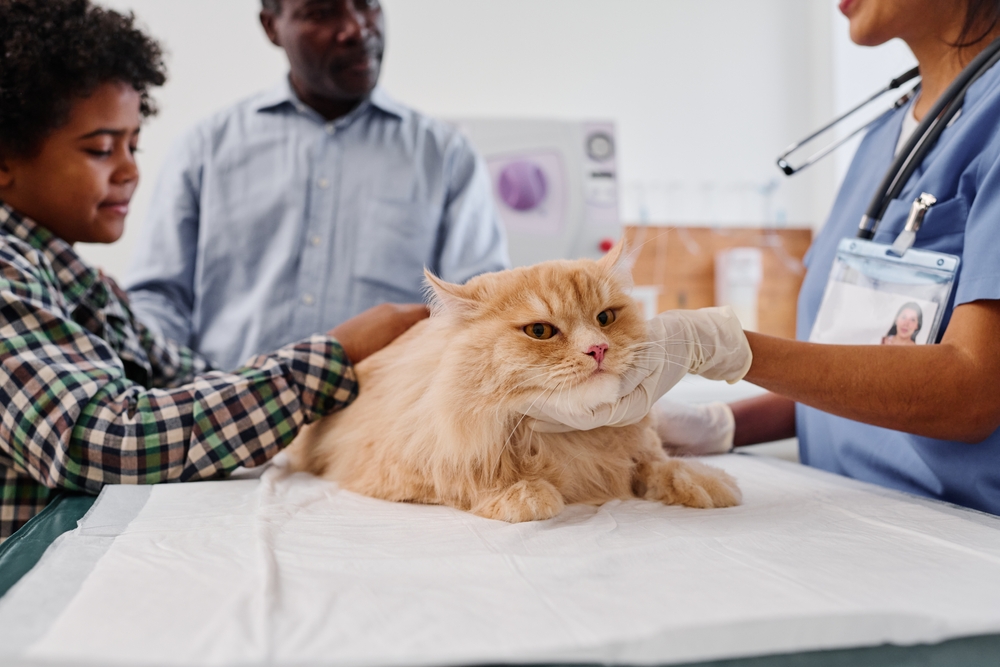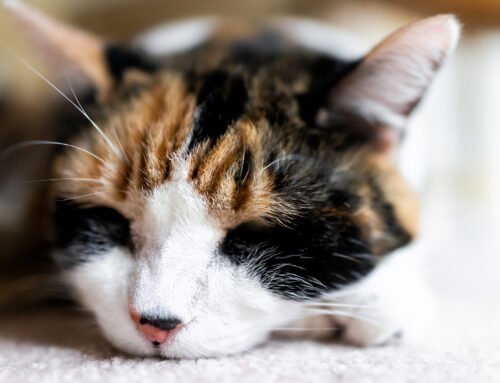Senior Pets, Lasting Comfort: Pain Relief, Mobility, and Quality of Life in Fort Worth
The signs of aging often appear in the quiet, ordinary moments. A once-playful bark at the doorbell turns into a curious glance from the couch. A cat that used to dart after toys now prefers to watch the game unfold from a favorite spot. Mealtimes may take a little longer, naps may last a little deeper, and nightly routines may shift in ways that only a close family member notices.
None of these changes mean a pet’s best days are behind them. With the right mix of attentive screenings, modern pain relief, and thoughtful home adjustments, senior pets can enjoy life with the same comfort, safety, and connection they always have. At Animal Hospital Southwest in Fort Worth, our focus is on honoring the years already shared while protecting the quality of the years ahead- helping every pet age with dignity, comfort, and joy.
Why senior care looks different
Older bodies change in quiet ways. Metabolism slows, immune responses shift, and organs work a little harder. That combination can hide illness until it is more advanced and make recovery slower after even simple procedures. Semiannual wellness visits let us track trends in weight, lab values, mobility, and behavior so we can act before small issues become big ones. Evidence-based screening and lifestyle adjustments recommended in the AAHA senior care guidelines help us tailor care to each pet’s age and risks, keeping comfort at the center of every plan as outlined in these veterinary senior care recommendations.
Chronic conditions in senior dogs
Osteoarthritis
Stiffness after naps, hesitating on stairs, or stopping short of the car’s back seat are classic signs of joint pain. Weight control, anti-inflammatory medication, and structured activity work together to maintain function. Many dogs benefit from Librela, a monthly injection that targets nerve growth factor to reduce osteoarthritis pain in a way that is not a sedative and does not strain the kidneys or liver. You can see how movement habits help too by building a routine of low-impact exercises for osteoarthritis that strengthen without overloading sore joints.
Diabetes mellitus
Increased thirst, frequent urination, and unexplained weight changes are common red flags. Consistent feeding times and insulin dosing stabilize blood sugar and protect long-term health. Clear guidance on diabetes management in pets helps families keep daily routines predictable and effective.
Hypothyroidism
A sluggish thyroid can look like extra pounds, low energy, thin coat, or recurrent skin infections. Screening bloodwork and confirmatory testing identify the problem early so we can restore hormone balance. Signs and diagnostics are summarized in this overview of canine hypothyroidism symptoms and testing.
Cognitive dysfunction
Night pacing, new anxiety, accidents in a previously housetrained dog, or standing and staring at a corner can signal brain aging rather than “stubbornness.” Diets formulated for mental sharpness, environmental enrichment, and targeted medications can slow decline. Start the conversation if you notice any of the early signs of cognitive decline so we can keep days calmer and nights more restful.
Chronic conditions in senior cats
Arthritis behind the graceful paws
Cats rarely limp. They simply stop jumping to windowsills, choose lower resting spots, or groom less because twisting is uncomfortable. Home adjustments and medical therapy make a big difference, and many cats find relief with Solensia, a monthly monoclonal antibody designed specifically to reduce osteoarthritis pain in cats. Learn how to spot mobility changes and adapt the home using this plain-language guide to feline arthritis and joint disease.
Chronic kidney disease
One of the most common problems in older cats, kidney disease often shows up as increased drinking, larger clumps in the litter box, and slow weight loss. Renal diets, hydration strategies, and regular labs can slow progression while preserving comfort. A helpful overview of stages and nutrition is available in this resource on the stages of chronic kidney disease and dietary therapy.
Hyperthyroidism
An overactive thyroid speeds metabolism, which can cause weight loss despite a great appetite, restlessness, and vomiting. Treatment options range from medication to iodine-restricted nutrition and radioiodine therapy. For a clear roadmap of choices, see the feline hyperthyroidism treatment pathways.
Cancer in aging pets
New lumps and bumps deserve attention. Many are benign, but some are not, and early action improves outcomes. If you are feeling something new, visit us for an exam and, if needed, imaging or biopsy. For context on patterns we watch for, review the common cancers in pets and the warning signs that merit prompt evaluation.
Preventive screening that changes outcomes
Aging well starts with looking early and often. Baseline bloodwork, urinalysis, blood pressure checks, and imaging reveal trends long before symptoms appear. Panels designed for seniors catch kidney and liver shifts, endocrine disease, and hidden inflammation. The value of tracking results over time is outlined in this overview of preventive testing panels for senior pets, and it mirrors the way we tailor care at each visit.
Recognizing pain you cannot see
Pets rarely cry out. Pain shows up as small changes in routine. Dogs take the long way around stairs, shorten walks, lick a joint, or hesitate before lying down. Cats pause before jumping, choose the floor over a favorite perch, sleep more during the day, or stop grooming the back half of the body. Appetite blips, irritability, and house-soiling can all be pain, not “behavior.” If you are seeing these patterns, it is time to adjust the plan. Modern analgesia now includes monthly injections like Librela for dogs and Solensia for cats, anti-inflammatories when appropriate, stomach protectants, nerve-modulating medications, and non-drug options such as acupuncture and structured movement. We will help you combine the right pieces so relief is noticeable and sustained.
Home care strategies that support comfort
Small shifts at home add up. Slippery floors become safer with runners or yoga mats. Ramps and steps put favorite spots within reach. Elevated bowls reduce neck strain. Heated or orthopedic beds ease morning stiffness. Gentle activity keeps joints moving and minds engaged, and you can round this out with evidence-based joint supplements for senior dogs when recommended. Older cats benefit from quiet grooming sessions that prevent matting and keep skin comfortable, and many families find these grooming strategies for older cats practical and calming. Do not overlook teeth. Oral pain and infection sap energy and raise inflammation throughout the body, which is why we emphasize professional cleanings and daily care based on these guidelines on why dental care protects overall health.

Quality of life, explained simply
Good days are not just about how long a pet lives. They are about how a pet lives. Quality of life means moving without obvious struggle, eating with interest, resting comfortably, interacting with family, and enjoying small routines like sniff-walks, window watching, or morning snuggles. When pain or illness starts to crowd out those moments, we use structured conversations and simple quality-of-life scales to guide decisions. You will never navigate this alone. Our role is to ease discomfort, adapt the plan as needs change, and support a peaceful, dignified end of life when that time comes.
How Animal Hospital Southwest supports senior pets
We practice collaborative medicine with specialists in internal medicine, oncology, behavior, and nutrition when cases are complex, and we maintain AAHA-accredited standards so every step of care meets rigorous benchmarks. If you want to understand what that means day to day, you can explore what AAHA accreditation means for your pet. Pain control is proactive here, not an afterthought. That includes monthly biologic therapies like Solensia – Zoetis Petcare for cats and Librela – Zoetis US for dogs, alongside traditional medications, nutrition, and movement plans that fit your home.
If urgent concerns arise, our team triages quickly, stabilizes, and keeps you informed from the first call through follow-up. For signs that need same-day help, you can review how we handle emergencies on our pet emergencies page.
Take the next step toward comfort and longevity
Your senior dog or cat deserves days that feel easy, meals that taste good, and rest that restores. If you are noticing new stiffness, changes in appetite, restless nights, or just fewer good days than before, we are here to help. Call (817) 292-8655 or request an appointment and we will build a plan that reduces pain, protects mobility, and keeps quality of life front and center. A lifetime of love deserves nothing less.







Leave A Comment